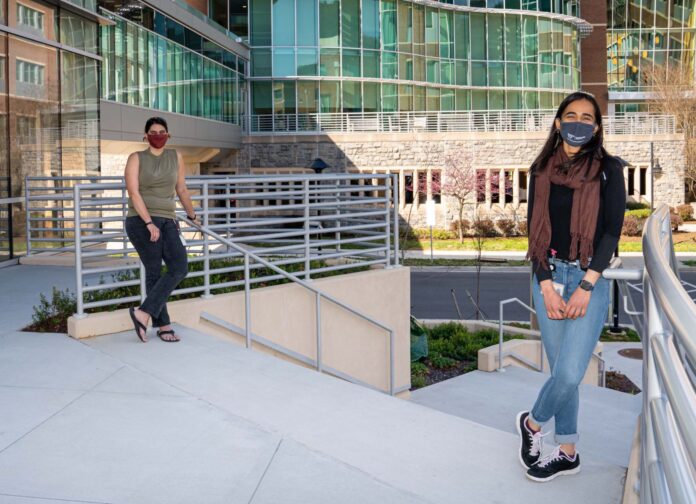From the cost of college to how to land an internship, the community college students had questions. A quartet of Virginia Tech students had the answers.
Fourteen Virginia Western Community College Fralin Futures STEM-H Scholarship students joined the discussion during a virtual question-and-answer session about science, technology, engineering, and mathematics (STEM) careers hosted by the Virginia Tech Carilion Student Outreach Program.
The event was the fourth edition of the panel, which is part of the student group’s ongoing work to promote interest in STEM and medical career opportunities in the region. The group has members across Virginia Tech’s Roanoke and Blacksburg campuses.
Rachana Deven Somaiya, a doctoral candidate in Virginia Tech’s Translational Biology, Medicine, and Health (TBMH) Program who works in the Fralin Biomedical Research Institute at VTC’s Fox laboratory, and Gates Palissery, a first-year TBMH graduate student, moderated the panel of four current and former students, three of whom began their academic careers at community colleges:
- Melissa Leaf, a community college graduate and veterinarian now attending the Virginia Tech Carilion School of Medicine.
- Mohammad Sabbagh, a Virginia Western and Virginia Tech graduate and an academic advisor for the Virginia Tech School of Neuroscience.
- Ubadah Sabbagh, a doctoral candidate in the TBMH program who attended three years of community college in Kansas.
- Natalia Jacobo, a senior computer science major at Virginia Tech.
“We really made an effort to find panelists who are relatable to Virginia Western students. Their direct experience of transitioning from a community college to a four-year college would certainly be helpful to these students,” said Somaiya, who is also the student group’s president.
“The STEM panel provides an opportunity for our community college students to ask questions in an environment that is not intimidating,” said Natasha Lee, Fralin Futures program coordinator at Virginia Western in Roanoke. “It also provides a chance for students at a community college to connect with students who were once in their shoes and helps to demystify the idea of graduate education.”
Paying for graduate school was a frequent talking point during the panel. The community college students learned that in many cases research or federal service opportunities cover the costs.
“That was a huge eye opener for our students,” Lee said. “The students also learned more about how to make the most of their time at Virginia Western and beyond through internships. At least a couple of students responded that graduate education was not even on their radar prior to attending the STEM panel.”
The panel is one of a range of efforts by the student group to make science accessible to the community, including science chats at coffee shops, science demonstrations at local schools and colleges, and the Big Lick of Science podcast.
Palissery will be stepping into the group’s leadership role upon Somaiya’s anticipated graduation in June 2022. Both see potential to expand the STEM panel to include students from other community colleges, as well as to continue the group’s efforts to grow the region’s STEM community.
— Written by Dawn Evans

